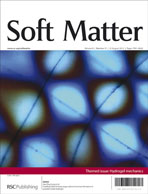Poly(vinyl alcohol) cast gels (PVA cast gels) were prepared at different gelation temperatures, Tgel, and the swelling ratio and mechanical properties were characterized by the equilibrium weight measurement, a uniaxial loading test, a tearing force measurement, and a cyclic compression test at room temperature. The results showed that the swelling ratio decreased and both the breaking stress and the tearing energy increased with an increase in Tgel. The compression deformation energy of 50% reduction of its original size increased monotonically, while the hysteresis loss was not affected by Tgel. To understand these macroscopic properties, the network structures of the samples were examined by X-ray diffraction and Fourier transform infrared measurements. As a result, the size of the microcrystallites increased with an increase in Tgel and the average distance between the microcrystallites also increased. These results suggested that the structures of PVA networks, crosslinked by the microcrystallites, have essential roles in determining the mechanical properties of PVA cast gels. The macroscopic mechanical properties are discussed on the basis of the size, number, and distribution of microcrystallites as crosslinkers and the homogeneity of amorphous PVA networks, which were determined at gelation.

You have access to this article
 Please wait while we load your content...
Something went wrong. Try again?
Please wait while we load your content...
Something went wrong. Try again?


 Please wait while we load your content...
Please wait while we load your content...